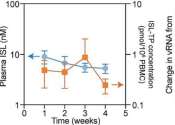Man who caught virus from a monkey in a critical condition—B virus explained
A 37-year-old man wounded by a wild monkey in Hong Kong is in intensive care suffering from infection with B virus.
Apr 16, 2024
0
0
A 37-year-old man wounded by a wild monkey in Hong Kong is in intensive care suffering from infection with B virus.
Apr 16, 2024
0
0

A person in Texas has been diagnosed with bird flu, an infection tied to the recent discovery of the virus in dairy cows, health officials said Monday.
Apr 1, 2024
0
55

A research team led by Associate Professor Liu Huan from the School of Humanities and Social Sciences of University of Science and Technology of China (USTC) proposes for the first time a historical periodization of the development ...
Apr 1, 2024
0
0

A team from Houston Methodist Research Institute recently showed that a nanofluidic implant delivered an HIV drug that achieved more potency than other forms of drug administration (oral) and other HIV drugs.
Mar 26, 2024
0
0

The COVID-19 virus can persist in the blood and tissue of patients for more than a year after the acute phase of the illness has ended, according to new research from UC San Francisco that offers potential clues to why some ...
Mar 7, 2024
0
597

Among people who had COVID-19, those who had received the latest vaccine had a lower risk of having a severe outcome than those who had not, according to new Cleveland Clinic research published in The Lancet Infectious Diseases.
Mar 6, 2024
0
22

An outbreak of mpox (formerly known as monkeypox) across Europe and North America made headlines in 2022.
Mar 4, 2024
0
18

The currently recommended five-day course of molnupiravir, an antiviral treatment, may not be long enough to treat COVID-19, according to a new paper involving UCL researchers.
Feb 27, 2024
0
28

Increased use of Paxlovid, the antiviral drug used to treat COVID-19, could prevent hundreds of thousands of hospitalizations and save tens of billions of dollars a year, according to a new epidemiological model published ...
Feb 23, 2024
0
9

Findings from a new study conducted by a team of researchers at Dartmouth's Geisel School of Medicine and Thayer School of Engineering and published in Cell Reports Medicine offer new insights into how antibodies function ...
Feb 12, 2024
0
66

Antiviral drugs are a class of medication used specifically for treating viral infections. Like antibiotics for bacteria, specific antivirals are used for specific viruses. Unlike antibiotics, antiviral drugs do not destroy their target pathogen but inhibit their development.
Antiviral drugs are one class of antimicrobials, a larger group which also includes antibiotic, antifungal and antiparasitic drugs. They are relatively harmless to the host, and therefore can be used to treat infections. They should be distinguished from viricides, which are not medication but destroy virus particles outside the body.
Most of the antivirals now available are designed to help deal with HIV, herpes viruses (best known for causing cold sores and genital herpes, but actually causing a wide range of diseases), the hepatitis B and C viruses, which can cause liver cancer, and influenza A and B viruses. Researchers are working to extend the range of antivirals to other families of pathogens.
Designing safe and effective antiviral drugs is difficult, because viruses use the host's cells to replicate. This makes it difficult to find targets for the drug that would interfere with the virus without harming the host organism's cells.
The emergence of antivirals is the product of a greatly expanded knowledge of the genetic and molecular function of organisms, allowing biomedical researchers to understand the structure and function of viruses, major advances in the techniques for finding new drugs, and the intense pressure placed on the medical profession to deal with the human immunodeficiency virus (HIV), the cause of the deadly acquired immunodeficiency syndrome (AIDS) pandemic.
Almost all anti-microbials, including anti-virals, are subject to drug resistance as the pathogens mutate over time, becoming less susceptible to the treatment. For instance, a recent study published in Nature Biotechnology emphasized the urgent need for augmentation of oseltamivir (Tamiflu) stockpiles with additional antiviral drugs including zanamivir (Relenza) based on an evaluation of the performance of these drugs in the scenario that the 2009 H1N1 'Swine Flu' neuraminidase (NA) were to acquire the tamiflu-resistance (His274Tyr) mutation which is currently wide-spread in seasonal H1N1 strains.
This text uses material from Wikipedia, licensed under CC BY-SA